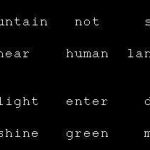2004
Sidebar images from "Literal Art: Neither Lines nor Pixels but Letters."
Anthony Enns juxtaposes two models of German media theory in reviewing new works by Oliver Grau and Friedrich Kittler.
Jan Baetens looks 'through' and 'at' Bolter and Gromala's Windows and Mirrors and finds a foggy vision.
Jess Loseby on "cyber-domestic" aesthetics.
Celia Pearce's position - anti-isolationist, but also anti-colonialist - derives from her understanding of "the unique properties of games themselves."
Chris Crawford considers Zimmerman's definitions.
A reply from game designer Eric Zimmerman that is receptive to multiple viewpoints, non-design or otherwise.
Jesper Juul suspects that things will remain unruly: big-budget, "cinematic" games will nose out experimental ones.
A recommendation for participatory, interdisciplinary articulations of action and perception from Mary Flanagan.
Celia Pearce hits SAVE and preserves most of Jesper Juul's essay. But then "non-computer contexts" hit the screen.
Jesper Juul takes time to complicate the real in different types of games.
Mark Bernstein explains that games have many lessons to learn from other artforms that speak to, and teach us, what it means to be human.
Asymmetries between event time and play time interest Mizuko Ito, who asks "How do you answer the door to get a pizza to nourish your flesh-and-blood body when you are in the middle of life and death online combat?"
Casting the ludology vs. narratology debate as a game in itself, Henry Jenkins brings Bible gardens and the duck-billed platypus into this defense of hybridity.
An appreciative reply that measures the incline of Henry Jenkins' middle ground.
The tenuous dynamics of Phoebe Senger's split story lead Lucy Suchman to ponder "methods and madness" in the metaphors we live by.
Even orienteering is of greater use to game designers than narratology, claims Marrku Eskelinen, heading towards an area free from stories once more.
As alternatives to agency-obsession, "critical technical practices" that connect art and technology are front and center in the work of Michael Mateas.
Whether CTPs should walk on three legs or two; how the robotic artwork Petit Mal is "interpretationally plastic;" what cultural assumptions we build into machines: just some of the response-topics here.
Eugene Thacker sees ethical acting as a potential stumbling block, one that trips up technological complicity.
